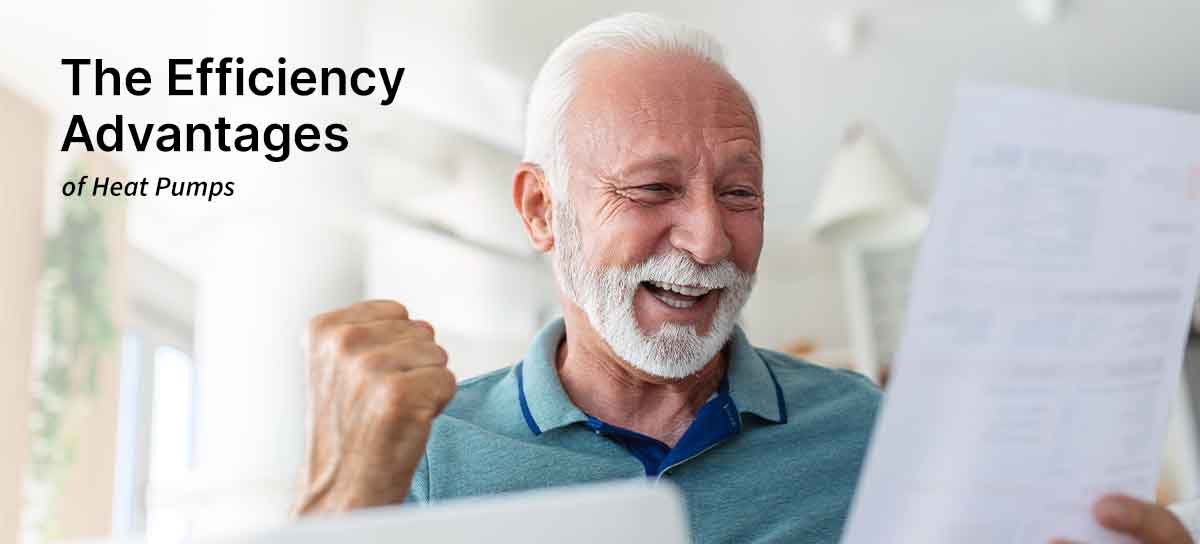
With increasing utility costs, homeowners are looking for ways to save money where they can.
Space heating costs the average Canadian homeowner more than $1,113 a year – more than half of the home’s total energy bill (54%)! In Canada, the average price of utilities is currently $81 per month for electricity and $137 per month for natural gas.
Nearly one in 10 Canadians spend more than 10% of their income on heating or cooling their home.
When it comes to modern energy solutions, there exists a quiet hero – the heat pump.
Imagine a system that not only keeps your home warm in winter and cool in summer but does so while saving your wallet and being mindful of the environment at the same time.
Heat pumps are an advanced technology for those looking to cut costs and reduce their carbon footprint simultaneously. In today’s blog post, we will share more information about heat pumps and explore efficiency advantages and environmental benefits that make them the eco-conscious homeowner's dream come true.
We understand how this can seem daunting and overwhelming at best. We are here to support you through this process. Our highly skilled team is one phone call or email away, so don’t be afraid to reach out for any of your HVAC needs.
Heat pumps are highly efficient heating and cooling systems that work by transferring heat from one location to another rather than generating it through combustion or resistance heating. They operate on the principle of moving heat from a cooler area to a warmer one, making them energy-efficient alternatives to traditional heating and cooling systems.
Heat pumps come in various types, each with its unique advantages. These include:
Heat pumps are versatile systems capable of both heating and cooling. During the heating mode, they extract heat from the outside environment (air, ground, or water) and transfer it inside, effectively warming the interior. During the cooling mode, they remove heat from inside the space and release it outdoors, cooling the indoor environment. This dual functionality makes them a comprehensive solution for year-round climate control.
One of the main efficiency advantages of heat pumps is their significantly higher energy efficiency compared to traditional heating and cooling systems like furnaces and air conditioners. Heat pumps excel at transferring heat instead of generating it, making them two to three times more energy efficient.
SEER and HSPF are metrics used to quantify the efficiency of heat pumps.
Heat pumps not only consume less energy but also translate that efficiency into tangible cost savings for homeowners. With lower energy bills, especially in regions with extreme temperatures, heat pump users can experience significant long-term savings. The increased efficiency often leads to extended equipment lifespans and reduced maintenance costs.
Heat pumps contribute to a reduced carbon footprint as they primarily rely on electricity to transfer heat instead of burning fossil fuels. By using electricity, which can be generated from renewable sources like wind, solar, or hydroelectric power, heat pumps can drastically decrease the carbon emissions associated with heating and cooling.
Because heat pumps are highly efficient and do not produce direct emissions on-site, they result in lower greenhouse gas emissions than traditional heating systems.
Heat pumps can easily be integrated with renewable energy sources, such as solar panels and wind turbines. When paired with renewable energy, heat pumps can operate with even lower environmental impact, as the energy used for heating and cooling is derived from clean and sustainable sources.
Heat pumps do not emit pollutants or particulate matter on-site, improving indoor air quality and reducing the local environmental impact. This is in stark contrast to some traditional heating systems, like wood-burning stoves or furnaces, which can release harmful pollutants into the air and contribute to smog and poor air quality in urban areas.
Choosing the right heat pump requires careful consideration of these factors to ensure that the system meets your comfort needs, fits your budget, and provides long-term efficiency and reliability. Consulting with a professional HVAC contractor can be invaluable in making the best selection for your home.
We understand how this can seem daunting and overwhelming at best. We are here to support you through this process. Our highly skilled team is one phone call or email away, so don’t be afraid to reach out for any of your HVAC needs.

Are you facing the eternal dilemma of choosing between a traditional furnace or a modern heat pump to keep your home warm and cozy?
As the temperatures drop and winter approaches, finding the perfect heating system becomes a top priority for homeowners. With the increasing focus on energy efficiency and environmental concerns, alternative heating solutions, such as heat pumps, have gained popularity as well. Understanding the differences between furnaces and heat pumps can help homeowners make an informed decision when selecting the most suitable heating system for their needs.
In this comprehensive blog post, we will dive deep into the world of heating solutions and explore the key differences between furnaces and heat pumps.
Whether you prioritize efficiency, environmental impact, or overall comfort, we've got you covered! So, let's embark on this enlightening journey to discover which heating option is the right fit for you and your home.
Say goodbye to uncertainty and embrace a toasty, well-heated home all winter long!
Did you know that over 50% of Canadians report using a furnace to heat their homes?
A furnace is a type of heating system commonly used to heat residential and commercial spaces. It operates by burning fuel, such as natural gas, oil, propane, or electricity, to generate heat. The heat produced by the furnace is then distributed throughout the building via ductwork and vents, providing warmth to different rooms.
Furnaces come in various types, including gas furnaces, oil furnaces, electric furnaces, and even wood-burning furnaces. Each type has its own advantages and considerations in terms of efficiency, cost, and environmental impact. Gas furnaces, for example, are popular for their relatively low operating costs, while electric furnaces are often chosen for their ease of installation and cleaner operation.
A heat pump is a versatile and energy-efficient heating and cooling system that moves heat from one place to another, rather than generating heat directly like a furnace.
It can serve as both a heating system during cold weather and a cooling system in hot weather, making it a year-round solution for indoor comfort.

During colder months, the heat pump extracts heat from the outdoor air, the ground, or even water sources, and transfers it indoors to heat the living spaces.
In warmer months, it operates in reverse, extracting heat from inside the building and expelling it outside, effectively cooling the indoor environment.
Heat pumps are available in various types, including air-source heat pumps, ground-source (geothermal) heat pumps, and water-source heat pumps. Air-source heat pumps are the most common and affordable option, utilizing the outside air as the heat source. Ground-source and water-source heat pumps are more efficient but involve higher initial installation costs.
One of the significant advantages of heat pumps is their high energy efficiency. Since they move heat instead of generating it through combustion, they can provide up to four times more heating or cooling energy than the electricity they consume. This makes them an eco-friendly and cost-effective choice for heating and cooling homes and buildings.
While heat pumps are well-suited for moderate to mild climates, advancements in technology have expanded their usability in colder regions. Understanding the characteristics and benefits of heat pumps in comparison to traditional furnaces can help homeowners determine the best option for their specific heating and cooling needs.
Depending on your climate you may need to have both a furnace and a heat pump. These are called dual fuel systems. The heat pump will do the bulk of the heavy lifting during the year. If the outdoor temperature gets cold for several days, the system will automatically switch over to the gas furnace. Basically, the temperature will tell the system to turn on the best tool for the job to be the most efficient, saving you power and money.
Furnaces have been around for a long time. For decades they were the heating system of choice, particularly in residential areas with access to natural gas. There are many advantages to choosing a furnace. Here are a few:
All good things have their downsides, and the furnace is no different. Here are a few disadvantages:
Heat pumps are gaining popularity as an important step to transition our home heating systems away from burning fossil fuels.

Here are some of the big advantages to choosing a heat pump:
And the disadvantages are:
Generally, individuals will choose a furnace because they are:
On the other hand, individuals will choose a heat pump because they are:
Before you make your final decision invest in an energy audit. This will help you find air leaks and seal them and add insulation to reduce heat loss, extending the life of whatever system you invest in because they’ll have to work a little less hard. Energy audits are also the first place to start to learn whether you qualify for any government or energy company rebates in your area.
In conclusion, the decision between a furnace and a heat pump comes down to your specific needs, priorities, and the climate in which you reside. Both heating systems have their distinct advantages and disadvantages, making each a viable option depending on individual circumstances.
Furnaces are known for their affordability and quick heating capabilities, but they tend to be less energy-efficient and contribute to carbon emissions. On the other hand, heat pumps offer significant energy savings, year-round comfort, and reduced environmental impact, but they come with higher upfront costs.
Whether you choose a furnace or a heat pump, remember to consider factors like existing ductwork, available rebates, and your overall commitment to energy efficiency and environmental stewardship.
Ultimately, by taking the time to understand the differences between these two heating systems and evaluating your unique requirements, you can make an informed and confident choice to ensure a warm, comfortable, and eco-friendly home throughout the seasons.
